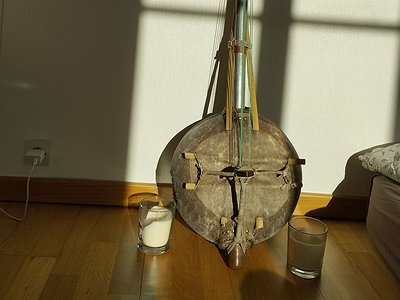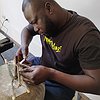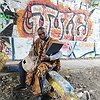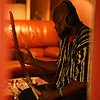Name: Boubacar Samaké
Nationality: Malian
Occupation: NGoni player, vocalist, hunter
Recent release: Boubacar Samaké teams up with Damien Vandesande for the self-titled debut album of their new duo Siraba, out via Secret Teachings. Remixes for the singles have featured contributions from Peaking Lights, Joeski, and St. Germain.
Recommended Ngoni recordings: You can listen to this record with some of my father's classics: Sibiri Samaké – Djitoumou Kono - = Mali: Music Of The Hunters (Buda Records)
And I recommend one of the oldest Hunter recording from one of the greatest masters: Toumani Kone – Vol. 2 - (MGS 3004)
[Read our Joeski interview]
Tool of Creation: NGoni
Type of Tool: String instrument
Country of origin: West Africa
Became available in: 14th century (or possibly earlier)
[Read our Damien Vandesande interview]
If you enjoyed this interview with Boubacar Samaké about the NGoni and would like to explore his music in more depth, visit him on Instagram.
What was your first encounter with the NGoni? What was it about it that drew you in?
It’s very simple - my father is a very big NGoni player, and I followed in his footsteps. I started playing the NGoni when I felt it was my turn to learn the instrument; it was calling to me, and it was impossible to resist.
Initially, my father didn’t want me to start, so I had to hide to practice. When he discovered it, he broke my instrument and warned the entire neighbourhood that if anyone heard me play, they were to inform him so he could punish me. But it never stopped me.
One day, during a ceremony led by my father, I entered the circle with an instrument and sat next to him. He was so choked that I dared to do that, his look told me ‘If you are arrogant enough to disobey me, then play and let me hear what you can do.’
Just like any other instrument, the NGoni has a rich history. What are some of the key points from this history for you personally?
To play this instrument is to keep a very ancient tradition and keep a community alive.
The NGoni is a very old instrument that has been kept in its original form for centuries. It’s originally from the Wassoulou region in West Africa and I’m a part of that community myself from father to son.
The instrument is a link to our community; you can’t pretend that it’s not. It’s the musical voice of hunters.
What, to you, are some of the most interesting NGoni recordings and performances by other artists in terms of your personal development?
Just my father, the great Sibiri Samaké, and his repertoire. I learned every song from my him, being his disciple, touring with him for many years. I learned all the percussions, choirs and more.
I represent both a blood line and a musical line; he is my main Inspiration and always will be. I am very grateful for his legacy.
When talking about electronic devices, we often think about their “features”. But the NGoni is a complex device, too. What are some of its stand-out features from your point of view? How would you describe its sonic potential?
What makes the NGoni unique is its tonality, a pure pentatonic for the traditional version. Made of Calebasse, goat skin and Bamboo and nylon strings nowadays.
You can develop many special features on the instrument, like harmonics, percussive use, slaps and more .
Instrument design is an ongoing process. Are you interested in recent developments for the NGoni in this respect?
Yes, I’m interested, and I’ve built some prototypes myself. But let’s be honest, I’m not satisfied until it sounds like a NGoni.
I tune it in some interesting ways. I make portable and small NGonis to be able to travel in planes. I’ve experimented with different string configurations from 6 to 12 or 14.
But I respect the traditional ways of making it, and I often mix techniques.
In the light of picking your instrument, how would you describe your views on topics like originality and innovation vs perfection and timelessness in music? Are you interested in a “music of the future” or “continuing a tradition”?
First of all, I build all of my instruments myself from beginning to end. I always see to it that they are perfect. An NGoni gets even better as it gets older. 
Boubacar Samaké Interview Image (c) the artist
Musically I’m interested in both, keeping the tradition alive and creating music for the future with Siraba for example.
Tell me about the process of learning to play the instrument and your own explorations with it.
We learn the basic patterns that teach us how to make the sound of the 6 strings of the NGoni. We repeat them again and again.
From the beginning, I experimented to make it sound new and personal, often playing with other instruments from any culture. Because initially the NGoni would only be played only with the NGoni and some percussions like the Karrignan (metal percussion) or Kuchumba (shakers).
We were playing everyday while learning with my father and other disciples.
What are specific challenges in terms of playing the NGoni?
First of all, you need to be initiated to be part of the community, this is the main challenge.
There are no technical challenges in learning the instrument. It’s more what’s around it - being accepted by the community, learning everything that makes you a hunter and a Serer (the one who tells history and tales), and to earn respect from the elders.
Siraba Interview Image (c) the artists
What interests you about the NGoni in terms of it contributing to your creative ideals?
I can create non-traditional pattern and compose new repertoire. I’ve always wanted to bring this instrument and tradition all around the world, so that people can learn about it.
I like to play with all types of music. My creativity starts when I touch my instrument.
Also, I know some very rare patterns, and it’s creatively fulfilling to revive them with my touch.
Some see instruments merely as tools towards creativity, others feel they go hand in hand. What's your take on that?
I see my instrument as an extension of my hand. We work together as one.
How do you see the relationship between your instrument and the music you make?
It’s the centre, everything starts with it and is built around it.
How would you describe your personal style of playing the NGoni?
I have a soft approach to the Instrument compared to others, although I can play hard and fast. I possess a solid and precise rhythm.
Boubacar Samaké Interview Image (c) the artist
What does playing your instrument feel like, what do you enjoy about it, what are your own physical limits and strengths?
It’s hard to describe; I become one with my instrument. I don’t have have many words for it; the music speaks for itself.
I have no physical limits when playing my instrument; I can play for 24 hours without stopping, and that’s my force. We are trained to play for many hours during ceremonies.
Could you describe working with the NGoni on the basis of one of your pieces, live performances or albums that's particularly dear to you, please?
My favorite track on the album is ‘Toroba’, because what I play speaks about orphaned kids, and the NGoni lines as well. It’s not from the traditional repertoire; it’s my own composition.
Music from Mali always has to be morally good. It has to educate people and encourage them to follow a good path, both for others and for themselves.
How, would you say, does the NGoni interact with other instruments from ensembles/groups you're part of?
For example, on the album, I play with a cello player, Maaelise Parisot. I felt that my NGoni was telling me new words, that he enjoyed so much. I could hear him telling me new things.
NGoni by its pentatonic structure, blends with every musician and every instrument easily. It has an ancestral musical structure.
Boubacar Samaké Interview Image (c) the artist
Are there other NGoni players whose work with their instrument you find inspiring? What do you appreciate about their take on it?
I told you before, only my father … Sorry I can’t mention any other name, ahahaha.
Imagine if someone else from my family and community reads this interview. My father is an extraordinary NGoni player, one of the best ever, with so much creativity and strength, like no one else!!!







